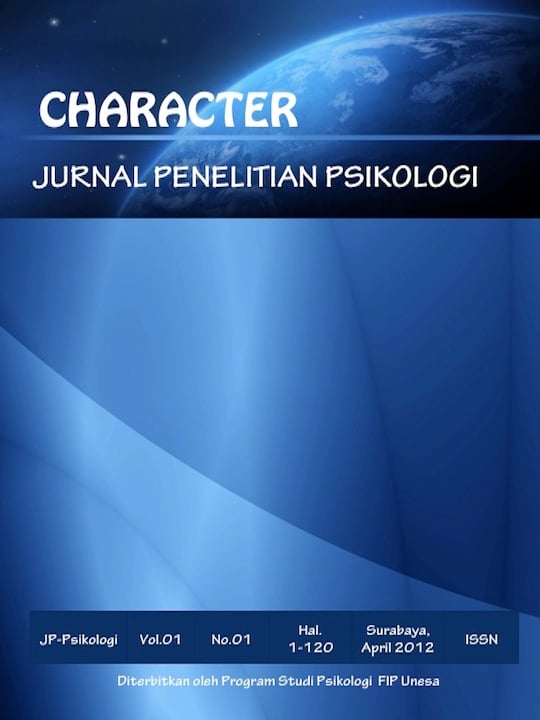HUBUNGAN ANTARA FEAR OF COVID-19 DENGAN KEPUASAN KERJA PEGAWAI DIVISI TRANSMISI DISTRIBUSI PERUSAHAAN X
DOI:
https://doi.org/10.26740/cjpp.v9i6.47312Abstract
Abstrak
Kepuasan kerja merupakan salah satu hal penting yang perlu diperhatikan untuk meningkatkan produktivitas dan kinerja pegawai, sehingga pegawai dapat memberikan hasil kerja yang maksimal bagi perusahaan. Terutama di masa pandemi, pegawai yang melaksanakan work from office merasa takut untuk bekerja dan bertemu banyak orang, sehingga pelayanan yang diberikan kurang maksimal. Tujuan dari penelitian ini adalah untuk mengetahui hubungan antara Fear of Covid-19 dengan kepuasan kerja pegawai Divisi Transmisi Distribusi Perusahaan X. Populasi dalam penelitian ini yaitu seluruh pegawai Divisi Transmisi Distribusi Perusahaan X dan Teknik penentuan sampel menggunakan sampling jenuh. Teknik pengumpulan data yaitu menggunakan kuisioner dengan skala Indonesian Version of the Fear of Covid-19 dan skala kepuasan kerja disusun berdasarkan aspek kepuasan kerja yang dikembangkan oleh Jewell dan Siegall. Uji Analisis dalam penelitian ini menggunakan korelasi pearson product moment dengan bantuan SPSS 25.0. Hasil uji hipotesis menunjukkan nilai koefisien korelasi sebesar (r=-0,831) dengan taraf signifikansi 0,000 (p<0,05) yang dapat diartikan bahwa terdapat hubungan negatif antara Fear of Covid-19 dengan kepuasan kerja pegawai divisi transmisi distribusi perusahaan X, sehingga apabila Fear of Covid-19 yang dirasakan pegawai divisi transmisi distribusi perusahaan X meningkat, dapat menurunkan kepuasan kerja pegawai. Sebaliknya, apabila Fear of Covid-19 yang dirasakan pegawai divisi transmisi distribusi perusahaan X menurun, dapat meningkatkan kepuasan kerja karyawan.
Kata Kunci: Fear of Covid-19, Kepuasan Kerja, Pegawai.
Abstract
Job satisfaction is one of the important things that need to be considered to increase employee productivity and performance, so that employees can provide maximum work results for the company. especially in a pandemic situation, employees who carry out work from office have a feeling of fear of meeting many people, so the services provided are not optimal. The purpose of this study was to determine the effect of Fear of Covid-19 on job satisfaction of distribution transmission division employees of company X. The population in this study were all employees of distribution transmission division of company X and The sampling technique uses saturated sampling. The data collection technique used a questionnaire with the Indonesian version of the Fear of Covid-19 scale and the job satisfaction scale based on job satisfaction aspects developed by Jewell and Siegall. Test Analysis in this study using Pearson product-moment correlation with the help of SPSS 25.0. The results of the hypothesis test show a correlation coefficient (r=-0.831) with a significance level of 0.000 (p<0.05), it means that there is a negative relationship between Fear of Covid-19 and job satisfaction of employees of the distribution transmission division of company X, so if fear of Covid-19 felt by employees of the distribution transmission division of company X increased, will decreased employee job satisfaction. On the other hand, if fear of Covid-19 felt by employees of the distribution transmission division of company X decreased, will increased employee job satisfaction.
Keywords: Fear of Covid-19, Job Satisfaction, Employee.
Downloads
Downloads
Published
How to Cite
Issue
Section
License
Authors who publish in this journal agree to the following terms:
Copyright in any article is held by the author.
The author grants the journal, publication rights with the work simultaneously licensed under a Creative Commons Attribution License that allows others to share the work with an acknowledgment of the work's authorship and initial publication in this journal.
Authors may enter into separate, additional contractual arrangements for the non-exclusive distribution of the journal's published version of the work (e.g., posting it to an institutional repository or publishing it in a book), with an acknowledgment of its initial publication in this journal.
Authors are permitted and encouraged to post their work online (e.g., in an institutional repository or on their website) prior to and during the submission process, as this can lead to productive exchanges, as well as earlier and greater citation of published work.
 Abstract views: 215
,
Abstract views: 215
, PDF Downloads: 192
PDF Downloads: 192





